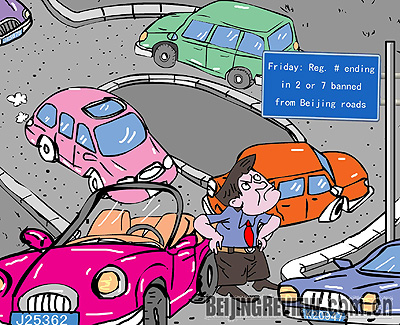|

Beijing authorities recently announced the extension of the city's vehicle restrictions for another year, from April 11, 2009 to April 10, 2010, excluding legal holidays. According to the first round of auto restrictions designed for the Beijing Olympics, private vehicles were banned from roads from 6 a.m. to 9 p.m. daily, alternating between odd and even registration plate numbers. The new measures banned vehicles from 7 a.m. to 8 p.m. one day a week, also operating on the odd-even system.
Beijing took a fifth of the city's 3.61 million vehicles off its roads each weekday and the government continued to take 30 percent of its cars off the roads. Police vehicles, emergency vehicles, buses and taxis are exempt from the restrictions.
The new decision has triggered massive debates. Some people believe the ban should have only been a temporary policy for the Olympics' period. They feel long-term compulsory restrictions are unreasonable. They say the government is paradoxically encouraging people to buy low-emission cars during the current economic crisis, and then discouraging driving by implementing bans.
However, supporters of the restrictions say the urban traffic network is already saturated and it's impossible to solve the congestion problem by expanding road networks. The only solution to help with gridlock is to cut the number of vehicles running on the roads. In China, vehicles are used too frequently. Even in the United States, the average annual mileage only stands at 19,000 km and in Japan it is less than 10,000 km. In China the figure is 30,000 km. Chinese have become too dependent on cars.
The new decision was made partly based on public surveys that show 70 percent support the ban. A more recent survey of roughly 3,600 car owners, conducted by the municipal-run Beijing Traffic Research Center, showed almost 90 percent of city residents support the auto restriction being extended.
Buy more cars
Guan Xuejun (www.8jiewang.com): When hearing Beijing's traffic restriction will be extended one more year, the first thing many people thought was to buy another car to cope with the odd-even number-based restriction. Car-owners will be forced to take taxis once a week, which could end up costing about 300 yuan ($44) every week, as several family members who work or study in different places all have to take a taxi. Thus, every month, in order to obey the new rule, they have to spend about 1,000 yuan on taxis and endure all the inconveniences caused by the ban.
The auto restriction is in essence a violation of people's private rights. If the government realizes the city's traffic resources are insufficient, it should first try to improve traffic capacity.
The public understood and supported the vehicle restrictions during the Olympics because they knew it was a temporary measure during a special time, but if the temporary measure is made routine, it shows the government's indifference to its citizens' rights. With their rights being neglected, many families have no choice but to buy another car, despite the large costs involved.
The government's indifference to the public's private rights will create much ill feeling and mistrust. Such a simple policy as this will not only waste citizens' funds, but also damage the government's image.
Auto restrictions may help to ease traffic flow during a certain period of time, but it creates serious problems in urban traffic administration and road facilities. Gradually, the total number of private cars will increase, as the cars that are banned from the roads will soon be replaced by additional newly bought cars. Then, will the government announce two and three day's restrictions every week?
| 